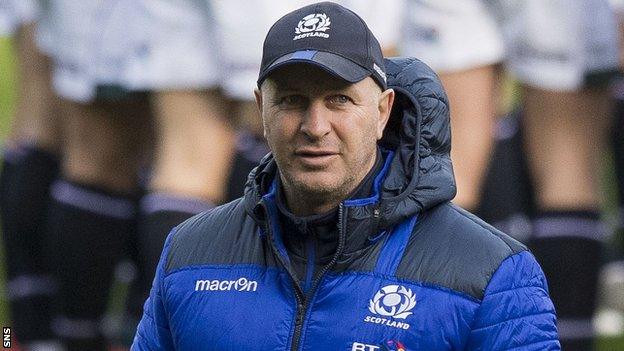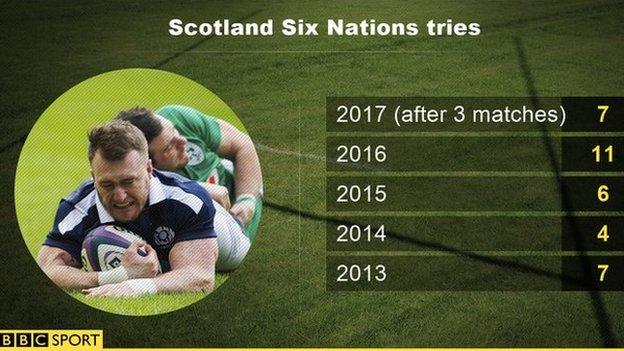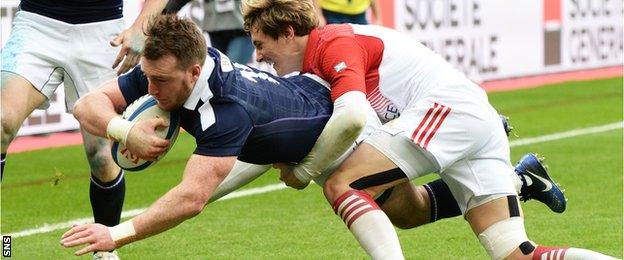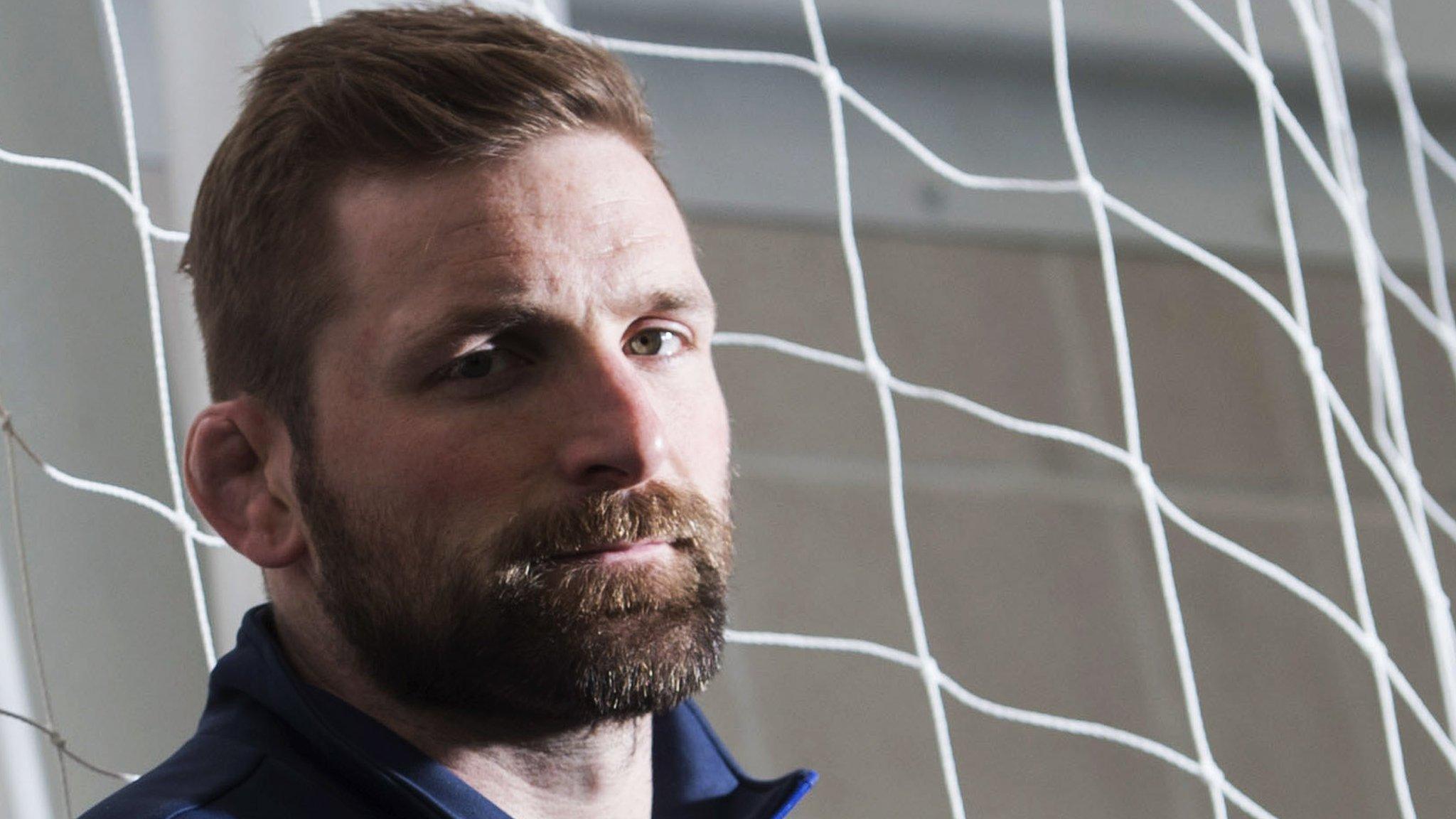Six Nations 2017: Scotland attack coach Jason O'Halloran brings 'organised chaos'
- Published

Jason O'Halloran will leave the Scotland set-up at the end of the season to join Glasgow
Six Nations Championship: England v Scotland |
|---|
Venue: Twickenham Stadium Date: Saturday, 11 March Kick-off: 16:00 GMT |
Coverage: Live on BBC Radio 5 live & BBC Radio Scotland, plus live text commentary via the BBC Sport website and BBC Sport app |
Jason O'Halloran has heard the chat, the compliments but also the caveats, the praise for what Scotland are doing in this Six Nations but also the stuff about 'smash and grabs' and how Ireland and Wales 'should have won' those games.
"I've heard that, yeah," says O'Halloran, Scotland's attack coach brought in from Manawatu in time for the 2016 Championship.
"They say, 'Oh, Ireland had a bad day and Wales had a bad day.' Apparently everyone we've beaten has had a bad day. It's patronising at times. I think it's a bit of a hangover from the past."
Before Saturday's trip to face England at Twickenham, this is a story about O'Halloran, but mostly it's about the fantastic evolution of the Scotland attack, the transformation from puny to predatory in the two seasons that O'Halloran has been on the scene as Vern Cotter's assistant.
To get a proper angle on the present it's worth looking at the past, the cow's-backside-with-a-banjo years as they could legitimately be called. Remember the struggle to score? Remember the angst?
As one international coach of that vintage put it: "Scotland didn't have an attack. They had no threat, no ideas. All you had to do when playing against them was make your tackles and wait for them to make a mess of it."
Only he didn't use the word 'mess'. It was something more derogatory, something that spoke to a lack of respect for what the Scotland attack was putting on the table.
Going into this Six Nations, the all-time try-scoring table (85 games) read like this: England were top on 245, Ireland second with 211, France third with 200, Wales fourth with 183, Italy fifth with 105 and Scotland bottom with 102. In that run, Scotland failed to score a single try in 31 of the Tests and scored a solitary try in 23 others. That's one try or no try in 64% of their games in Six Nations history.
Let's update some numbers because nobody is mocking the Scotland attack now. In the 2017 Six Nations Scotland have, so far, scored seven tries in three games - that's more than they managed in the whole championship in 10 of the previous 17 seasons. And they haven't played Italy yet.

Scotland have scored more tries in their last eight Championship games than the previous three seasons combined
In O'Halloran's eight Six Nations games as an attack coach Scotland have 18 tries - that's more than they'd scored in the previous 15 Six Nations games combined. Last season was his first in the position; Scotland scored 11 tries - their highest championship total since 1999.
"When I came in I looked at a number of games and I felt that we lacked a basic structure when we got into the green zone," says O'Halloran.
"The typical Scottish mentality was to go harder as individuals, which invariably leads to an isolated carry and a turnover, a penalty or dropped ball. I thought if could harness the energy and do it in a collective manner we'd have a lot more success."
Try by try he goes through Scotland's scores from this Six Nations. Stuart Hogg's first against Ireland and the subtle things that happened around it, the way Sean Maitland came off his wing and threw Garry Ringrose off his defensive duties.
"It's all those little things that people don't see," he says. "That's him working off the ball. We talk a lot about working off the ball. He's on the other side of the pitch and he's seen it's not on so he says, 'I can get involved in the game over there' and his presence is a factor in that try even though he doesn't touch the ball.
"Sometimes we're guilty of putting all the decision-making on the 10 but it's the running lines of other people off the ball that gives you the situations you're after.
"Our analysis said that Ireland get quite tight with their defence and we could beat them for pace on the outside. Hoggy's second try is a result of that. For guys like Hoggy it's all quite natural; it's pretty innate."
Until recently, this was alien territory for Scotland who are fast developing a habit of making a little possession go an awfully long way. They have become ruthless, a scenario that no Scottish supporter could have envisaged a few years back.

Stuart Hogg scored his 16th try for Scotland in Paris, and his 10th in the Six Nations
Take Scotland's opening try in Paris and the Huw Jones' appreciation of what's happening.
"He beats one man and then [Virimi] Vakatawa bites and gets sucked in and then Huw offloads to Hoggy. Without making a generalisation, I've coached a lot of Fijians and they all do that. They turn in. Once he did that then Huw has the skill and the composure to get the pass away and Hoggy's footwork takes him over.
"In terms of footwork, of the players I've been around, Hoggy is second only to [New Zealand's] Nehe Milner-Skudder.
"Vakatawa bites for the second try as well. He wants to move in and jackal the ball but if you move in on the ball and there's an offload then you're in trouble and Finn [Russell] is looking for that. It's just a natural part of his game. He's always looking for things like that.
"Tommy Seymour takes a great option with the kick after that. It's about making good decisions and our decision-making is getting better. Then Tim Swinson runs a fantastic line. He's got good rugby nous and a big motor on him, Tim."
Scotland's desperate losing run at Twickenham might well continue this weekend, but there's an odds-on chance of the visitors really putting it up to them. The team is maturing, the confidence is rising, the skills are growing. There's an elan in this team that hasn't been there since 1999.
"Finn is a little bit of a maverick - he plays with a smile on his face and I like that," says O'Halloran. "The fact that we've lost Greig [Laidlaw, through injury] means he's had to step up a lot. Against Wales, we saw him taking hold of the team tactically a bit more."
O'Halloran calls Seymour a real professional, great in the air, hard-working off the ball, a top bloke and deceptively quick. Jones, he says, is a threat even when he's not carrying. His presence alone and the knowledge of what he can do can be off-putting to defenders.
"The first try against Wales, Huw runs a great dummy line and Hoggy holds up the pass. It's about patience and identifying when the time is right to go. Finn does that with the second try. He sees Jonathan Davies jump out of the line a little bit and he knows if can get the ball beyond him it's going to put them under stress and create a two-on-one on the outside. That's great thinking under pressure.
"The thing I really like about that try is that we bombed a certain score just before half-time in the exact same circumstance against Ireland. I love the fact that my players pick things up pretty quickly."
The statistics tell him that in their three games so far Scotland have scored tries in 40% of their visits to the opposing 22.
"Everybody has a grand vision on how they want their team to play but your skills always dictate your tactics; the broader your skill-set the more tactical options you have. Organised chaos - that's what we want. We're looking to create chaos in the opposition with high amounts of energy.
"The next evolution for this team will be ditching the craving of the underdog status and that's a massive mentality shift that we need to go through as a group. We're still more comfortable as underdogs, but we have to get to a place where we're comfortable being favourites.
"Now, against England, we're legitimate underdogs because the opposition have won 17 in a row. They're going for a world record here. We have, in most people's eyes, over-achieved. So the pressure is off."
O'Halloran says he has no regrets about turning down the offer of being the Lions attack coach in New Zealand this summer. He did it because he's moving to the Glasgow set-up next season and wants to get to know and work with the non-Test players so the team can hit the ground running next season.
"I'd like to have stayed [as Scotland assistant coach] but if this team continues to grow I'll feel like I've been a part of it."
Has he thought of what a victory at Twickenham might feel like? "Oh yeah, without a doubt. I've been thinking about that since full-time against Wales.
"As a coaching team it's our last away game together and it would be a nice way for Vern and the rest of us to finish off. They have awesome strength, but I'd be disappointed if we didn't trouble them. I genuinely believe they're the ones with all the pressure on them."
- Published8 March 2017

- Published7 March 2017

- Published3 March 2017